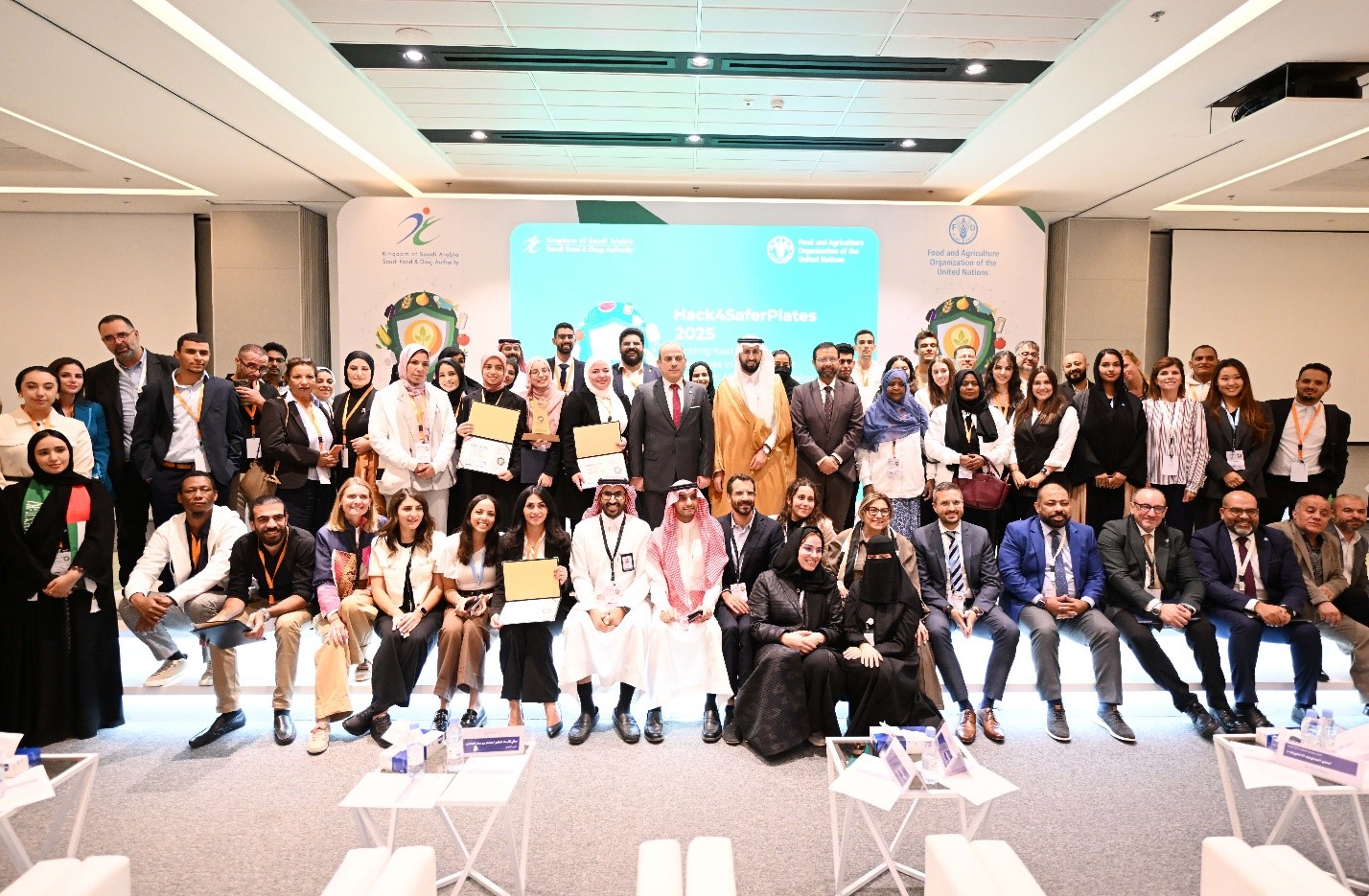Hack4SaferPlates 2025: Innovation meets impact in Riyadh

The first-ever Hack4SaferPlates concluded in Riyadh with a showcase of bold ideas, innovative thinking, and youth-led solutions set to redefine food safety across the Near East and North Africa (NENA) region. Organized by the Food and Agriculture Organization of the United Nations (FAO) and hosted by the Saudi Food and Drug Authority (SFDA), the two-day event brought together technologists, policymakers, researchers, and entrepreneurs from across the region to tackle one shared challenge: how to make food systems safer, smarter, and more sustainable.
Launched under the umbrella of the Regional Food Safety Research and Innovation Network (RFSRIN), Hack4SaferPlates served as a platform for young innovators to transform their ideas into actionable solutions. Over an intensive two days, teams worked alongside mentors from international organizations, research institutions, and the private sector to develop prototypes that could strengthen food safety systems, reduce loss and waste, and enhance regional resilience.
After rounds of rigorous pitching and evaluation, Hunger Killers from Lebanon came in as the technology and innovation track first-place winner with their Smart Food Control system, a groundbreaking AI- and blockchain-based platform that predicts contamination risks before shipments reach borders. Their solution, backed by Lebanese company Hellotree, integrates FAO-validated methodologies and has already drawn the attention of governments and importers. “We came to Riyadh with a personal story and a bold idea, and we’re leaving with the belief that we can truly change the way the world looks at food safety,” said Tarek Moubarak, Team Lead of Smart Food Control. “This experience proved that innovation, when paired with the right guidance and vision, can turn a family’s loss into a global solution that protects millions.”
In the policy track, Basket of Life claimed first place with their 9Rs Circular Bioeconomy Policy Framework, a transformative approach to managing food by-products, fostering circularity, and localizing green jobs across the NENA region. “Hack4SaferPlates showed us how collaboration turns bold ideas into workable roadmaps,” said Murad Abuaddous, the team’s lead. “We’re proud to help make our region’s food systems safer, smarter and more inclusive.”
The second-place award went to Honexis, an IoT- and AI-powered platform that enables real-time monitoring of food safety conditions along the supply chain. “This journey has shown us that food safety innovation goes beyond technology, it is rooted in trust, resilience, and a shared commitment to protect communities,” said Fouad Lamghari Ridouane, Honexis team leader.
FoodiNova, winner of the third place, impressed judges with its Arabic-language smart farming system for small poultry producers. Designed for accessibility and affordability, the tool empowers smallholders to adopt digital monitoring and improve food safety compliance. “FoodiNova reflects our belief that technology, when tailored to local farmers’ needs, can transform small-scale agriculture,” said the team.
All four winning teams will now embark on a six-month incubation programme supported by FAO, and partners. The incubation will help teams refine their prototypes, test pilot models, and scale their solutions regionally.
In addition, CIHEAM Bari will offer scholarships to members of the top two teams for its “Open Innovation & Youth Entrepreneurship in the Mediterranean Agrifood Sector” and “Hybrid Master in Local Food Policy” programmes, further empowering the next generation of agrifood innovators.
Looking ahead, the top two teams, Hunger Killers and Basket of Life, will take the global stage to pitch their solutions at the AgriFood Pitch Battle session along with other startups from previous FAO led or co-organized challenges in the framework of the FAO Science and Innovation Forum (SIF) 2025 in Rome on 16 October, where they will represent the NENA region’s growing innovation ecosystem.
As Hack4SaferPlates 2025 comes to an end, one thing is clear: the future of food safety lies in collaboration, creativity, and the courage to reimagine systems for the better. What began as an idea-sharing hackathon in Riyadh has sparked a movement, one that connects young innovators across borders to ensure safer food for all.
Contact
NENA Office Communications (+20) 2 3331 6000 [email protected]
